|
by Pastor Neil
Sometimes narrative episodes come in pairs in the Bible, as if two stories were crafted on the same template. These two accounts of two sons of Jacob, Judah and Joseph, have many parallels and contrasts. On the surface the story of Judah and Tamar is a story of sexual incontinence and the story of Joseph and Potiphar's wife is a tale of sexual self-control. But the parallels go much deeper. Genesis 38-39: Judah goes down and lives among the Canaanites Joseph is taken down to Egypt Judah sets up business with Hirah Joseph is purchased by Potiphar Judah prospered with a growing family Joseph prospered and made his master prosper Judah makes an invitation to illicit sexual intercourse Joseph resists an invitation to illicit sexual intercourse Judah leaves behind his seal and its cord and his staff Joseph leaves behind his cloak Judah passes false judgement and Tamar is to be burned Joseph receives false judgment and is thrown in jail Taking a careful look at the scriptures, one can see that this happens quite frequently. We have seen this kind of parallel story-telling before: Genesis 27-29: Jacob disguises himself Leah disguises herself Tamar disguises herself Jacob puts on his brother’s clothing Leah puts on her sister’s clothing Tamar puts on different clothing Jacob steals his brother’s blessing Leah steals her sister’s blessing Tamar steals a blessing Exodus 13-17: Moses leads the people of Israel through the Red Sea on dry land Moses, in a dry land, brings water out of the rock for the people of Israel I Samuel 1-2: Elkanah’s dysfunctional family Eli’s dysfunctional family Mark 4-5: Jesus stills the raging storm Jesus silences the raging spirits John 3-4: Jesus meets a Samaritan woman at mid-day Jesus meets a Jewish man at mid-night Mark 6: King Herod throws a banquet for his birthday in his palace King Jesus throws a banquet for 5000 on a hillside What are we supposed to do with this kind of observation? Well, if nothing other than noticing the literary craft of the original authors, let us at least take notice of this kind of narrative skill. But also let us observe what the coupled narratives show us. Is there a balancing truth to be learned? Is there a fuller meaning to be grasped? Take a look at some of the psalms and see how a problem posed in one finds its resolution in the next. Zoom out just a little from the verse you are reading and ask the question: ‘What else is on the page?’ Happy reading!
0 Comments
Dear ICB family,
On Sunday on the basis of Joseph and Jesus I argued that even when the devil, our enemies, the world, or our own flesh intends us harm by doing evil to us, at the very same time, in the very same act, God intends that evil for good. That's what Joseph explicitly says to his brothers: "You intended to harm me, but God intended it for good" (Gen. 50:20 NIV). In other words, when Joseph's brothers sold him into slavery, their intentions and purposes were evil. In that very same act, God's intentions and purposes for Joseph were good. We see the same dynamic in Acts 4:27–28. After Peter and John were released from prison, they gather with other believers and pray, and that prayer includes these two breathtaking sentences: "Indeed Herod and Pontius Pilate met together with the Gentiles and the people of Israel in this city to conspire against your holy servant Jesus, whom you anointed. They did what your power and will had decided beforehand should happen." That is, Herod, Pilate, the Gentiles, and the people of Israel intended nothing but evil when they put the innocent Son of God to death. God, however, intended that very same evil act for good, namely, to provide salvation for the world. After the service on Sunday, someone asked me a very good question: It's clear that God intended evil acts for good in the cases of Joseph and Jesus. That's what the texts say. However, is it appropriate to apply these particular instances to us today and say that when we face evil, God intends those evil acts for good, too? Are there any cases when we should simply say that evil happened and God did not intend that evil to happen for good purposes? That is an excellent question that I think deserves a lot more attention than what I gave it in the sermon on Sunday. Am I taking a leap by saying that since God intended the evil perpetrated against Joseph and Jesus for good, God also intends the evil that happens to us today for good? I don't think I gave the dear brother who asked the question a very good answer, so I'd like to try to do better here. In short, I do think we can say that in any and all evil perpetrated against us today, God intends those evil acts for ultimate good. And I'd like to give you some reasons why. I want to preface all this by saying that I tread very lightly here. We're looking into some of the deepest mysteries of the universe. I chose to end the service with the doxology from Romans 11 on purpose to highlight that very fact. Yet, I do believe the Bible gives us some help in answering this question. In what follows I'll examine some of that evidence. Second Corinthians 4:17 says, "For this light momentary affliction is preparing for us an eternal weight of glory beyond all comparison" (ESV). In the context, the "troubles" Paul has in mind are things like being "afflicted in every way" (4:8), being "perplexed" (4:8), being "persecuted" (4:9), being "struck down" (4:9), carrying "in the body the death of Jesus" (4:10), "being given over to death for Jesus' sake" (4:11), and having "death… at work in us" (4:12). It's clear that those afflicting, perplexing, persecuting, and striking Paul down, causing him to carry Jesus' death around in his own body and experiencing death at work in him, were doing so with evil intentions. They meant what they did for evil. But then notice that in 4:17 Paul says that it's those kinds of afflictions that are "preparing for us an eternal weight of glory beyond all comparison." In other words, it's as if the afflictions have another intention or purpose in mind, namely, to prepare for us something that is so big and glorious we can't even begin to compare it with anything else. Such an intention is very much good! Now, obviously the afflictions themselves do not have a will. They themselves are merely acts committed by other people. That means that they in and of themselves cannot intend anything good or evil. Only those committing the acts can have an intention one way or the other. So while the people carrying out the afflictions are clearly intending evil by what they do, we must ask the question, "Who or what is intending those afflictions for good?" We could answer that by saying that there is some mysterious force in the universe at work that takes afflictions and intends those very evil afflictions for good. Or we could say that God himself intends evil afflictions for good. I'm inclined toward the second of those two options. Does not James 1:2–4 follow this very same logic? "Count it all joy, my brothers, when you meet trials of various kinds, for you know that the testing of your faith produces steadfastness. And let steadfastness have its full effect, that you may be perfect and complete, lacking in nothing." Again, James says that the testing of your faith (that is, "trials of various kinds") produces steadfastness. It is not hard to conclude that those bringing about the various trials that we encounter in our lives intend evil by doing so. Yet James' words almost sound like the trials have some sort of will in and of themselves and intend to produce such steadfastness. Of course, the trials themselves are not capable of possessing a will. So, as was the case in 1 Corinthians 4, we're left asking who or what does in fact intend the trials of various kinds for the good end of producing steadfastness which leads a person to being perfect and complete, lacking in nothing? Certainly not the ones inflicting the trials. I conclude that our being perfect and complete is God's intention in the various trials we face. (I would argue the same dynamic is at work in 1 Peter 1:6–9.) Lastly, I would point to Romans 8:28: "And we know that in all things God works for the good of those who love him, who have been called according to his purpose" (NIV). Compare the NIV with the ESV: "And we know that for those who love God all things work together for good, for those who are called according to his purpose" (ESV). Which is it? Do all things "work together for good" (ESV), or is it that "in all things God works for the good" (NIV)? The Greek grammar allows for either translation. We can understand the text to be saying that the things themselves work together for good, or we can understand the text to be saying that God is the one who actively works them together for good. In the end, I think we arrive at the same conclusion, namely, that it is in fact God who actively and intentionally works all things together for good, including Joseph's being sold into slavery by his brothers, the death of Jesus, and any of the various trials that you face day in and day out. I say that it must be God who intends all things—even evil—ultimately for good because even if we go with the ESV's rendering of the verse ("all things work together for good"), if you don't conclude that it's God who is doing that, you're left having to credit the fact that all things work together for good to some cosmic force, as if the things in and of themselves have the ability to achieve their desired good end somehow apart from God. I feel much more confident saying that, even if the ESV represents what Paul intended (and again, the grammar can go either way), ultimately it is God who brings about good in all things, even evil. And that is a blanket statement that applies equally to us today as it did to Joseph and Jesus. So those are my reasons why I would say that I am justified applying these verses about Joseph and Jesus to us today. I do really think that, given enough time—perhaps in some cases not until eternity—we'll be able to look back at all the evil we faced and conclude that God intended that very evil for good. I'll say that that does not mean God commits evil. Evil human beings commit evil. I'm simply saying that in some mysterious way, God intends even evil to accomplish good: like the salvation of God's people from a famine, or the salvation of the world from their sins, or an eternal weight of glory that is beyond all comparison, or our steadfastness which makes us perfect and complete, lacking in nothing. I'll end where I ended on Sunday. I believe this is true. I believe this is amazingly comforting and hope-filled. My enemies, the world, my flesh, and Satan himself cannot throw anything at me that God does not intend for good. However, that fact doesn't always feel very comforting, especially when the pain is still so sharp. So let's not be quick to take these glorious truths and shove them down people's throats when they're hurting. Let's be patient. Let's weep with those who weep. Let's be quick to hear and slow to speak. Let us speak truth, but let's do it when it might be best received, and that might take some time. Perhaps a lot of time. Be encouraged, dear brothers and sisters. God intends your good. Grace and peace, Pastor Eric What is the purpose of clothing? People wear clothes for many different reasons: to cover one's shame, to identify with a certain tribe, to protect in the workplace, to attract, to repel, to disguise, to impress, to oppress and for many other reasons.
In the story of Joseph and his family there is a lot of detail about clothing. It all starts with Rebecca who instructed Jacob to wear the clothes of his older sibling to disguise himself as Esau so that he could steal the blessing from Isaac his father. Rebekah took the best garments of Esau her older son, which were with her in the house, and put them on Jacob her younger son. Gen 27:15 There is a fair irony in the way that Jacob’s deception of his father is mirrored in Laban’s deception of Jacob. The trickster is tricked. One sibling is substituted for the other and receives a blessing while being disguised. Jacob deceived his father and Laban deceived Jacob. But in the evening [Laban] took his daughter Leah and brought her to Jacob, and he went in to her. …And in the morning, behold, it was Leah! Gen 29:23-25 Then as if there had not been enough deception, camouflage and disguise as a consequence of siblings wearing clothing that was not theirs to wear, Jacob made an ornate robe for his favourite son Joseph and the atmosphere in the family chilled to a cold hatred. It was not the wisest of gifts and to wear it was not the wisest decision! Now Israel loved Joseph more than any other of his sons, because he was the son of his old age. And he made him a robe of many colours. Gen 37:3 The hatred, which is fuelled by Joseph’s two dreams, festers and the brothers sell Joseph into slavery in Egypt. Reuben had been hoping to rescue the lad from the malicious grip of his other brothers, but they had already sold the 17-year-old favourite into exile in the land of the pyramids. Look at the numerous references to clothing in the next paragraph: When Reuben returned to the pit and saw that Joseph was not in the pit, he tore his clothes and returned to his brothers and said, “The boy is gone, and I, where shall I go?” Then they took Joseph's robe and slaughtered a goat and dipped the robe in the blood. And they sent the robe of many colours and brought it to their father and said, “This we have found; please identify whether it is your son's robe or not.” And he identified it and said, “It is my son's robe. A fierce animal has devoured him. Joseph is without doubt torn to pieces.” Then Jacob tore his garments and put sackcloth on his loins and mourned for his son many days. Gen 37:29-34 Meanwhile, Joseph is sold to the captain of the guard in Egypt. This man prospers because the Lord is with Joseph but his wife has a different plan for this new slave in the family. Her attempt at seduction fails, but once again Joseph loses his coat! That lad leaves his clothes all over the place. Joseph goes to jail and via the interpretation of dreams eventually comes before pharaoh and is appointed as a ruler over the whole land of Egypt. And what does Pharaoh do? Pharaoh took his signet ring from his hand and put it on Joseph's hand, and clothed him in garments of fine linen and put a gold chain about his neck. Gen 41:42 Here we are, right back at the beginning, Joseph is wearing fine garments which identify him as the favourite, the one who rules, the special one! There must have been a sense of déjà vu as the robes of pharaoh were placed on Joseph's shoulders and again when Joseph's brothers came to buy grain and bowed down before him. There is something very reminiscent of the whole plan of salvation in the Joseph story. Jesus shared the glory of the Father, laid aside that glory, emptied himself, became subject to death, then rose again, laid aside the death clothes, is once again clothed in glory and it is his prayer that we shall share in his glory (John 17:24). Is this not what was modelled when he washed the disciples feet? (John 13) Jesus got up from the table and laid aside his clothing (left his Father in heaven and laid aside his glory), wrapped a towel round his waist (adopted the role of a servant), washed the feet of his disciples (made them clean by an act of submission), then when he had washed their feet and put on his outer garments he resumed his place (he took up his renewed glory and ascended to the throne of God. Joseph’s brothers stripped him, threw him into a cistern, sold him into slavery in Egypt, but towards the end of the story he says, “..it was not you who sent me here, but God. You meant evil against me, but God meant it for good, to bring it about that many people should be kept alive, as they are today.” (Gen 45:8 and 50:20) Jesus was sold, stripped, laid in a hewn tomb and although Herod, the Romans and his own people conspired together to murder him, they only achieved what God had originally intended (Acts 4:27-28), the salvation of many. This theme of clothing, attempted disguise and camouflage, lost clothing, covering nakedness and re-clothing is one that starts in the garden of Eden and finishes in the holy city, the new Jerusalem. The divine question in Genesis 3:11 is, "Who told you you were naked?" Then in Genesis 3: 21 we read that, “..the Lord God then made garments of skin for Adam and his wife and clothed them.” At the other end of the Bible, in Revelation 3:18, there is an invitation from the risen Lord Jesus to, “…buy from me white clothes to wear, so that you can cover your shameful nakedness!” I looked, and behold, a great multitude that no one could number, from every nation, from all tribes and peoples and languages, standing before the throne and before the Lamb, clothed in white robes, with palm branches in their hands, and crying out with a loud voice, “Salvation belongs to our God who sits on the throne, and to the Lamb!” Rev 7:9-10 I saw the holy city, new Jerusalem, coming down out of heaven from God, prepared as a bride adorned for her husband. Rev 21:2 So then, dear brothers and sisters, “…let us put off the old self, which belongs to our former manner of life and is corrupt through deceitful desires, and to be renewed in the spirit of our minds, and to put on the new self, created after the likeness of God in true righteousness and holiness.” Eph 4:22-24 |
Archives
May 2024
Categories
All
|

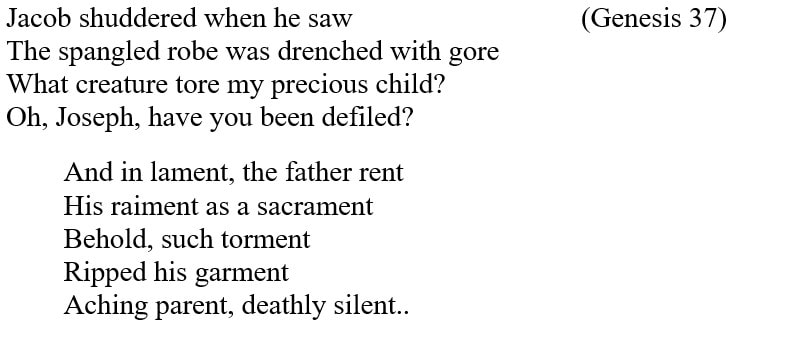
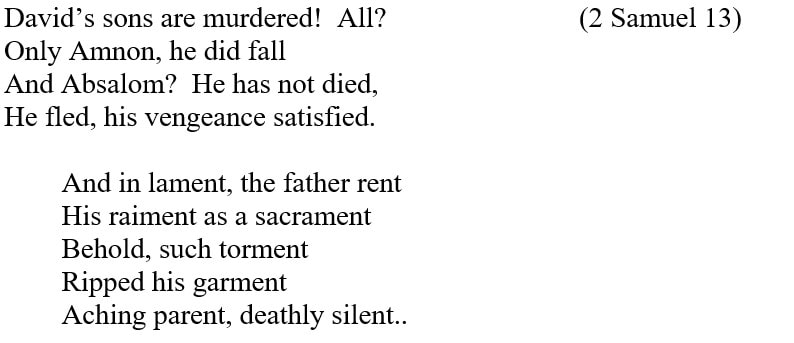
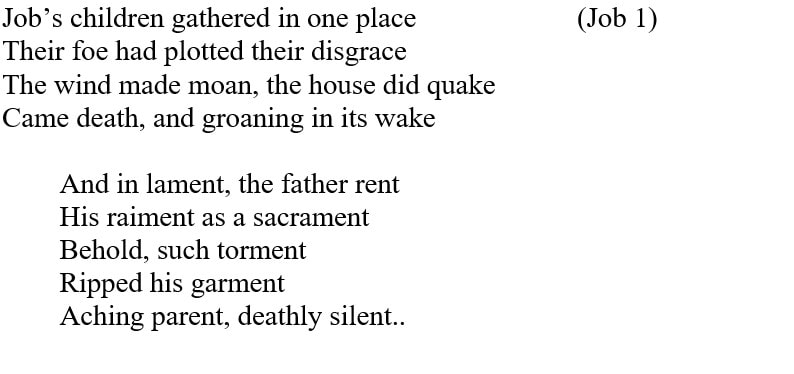
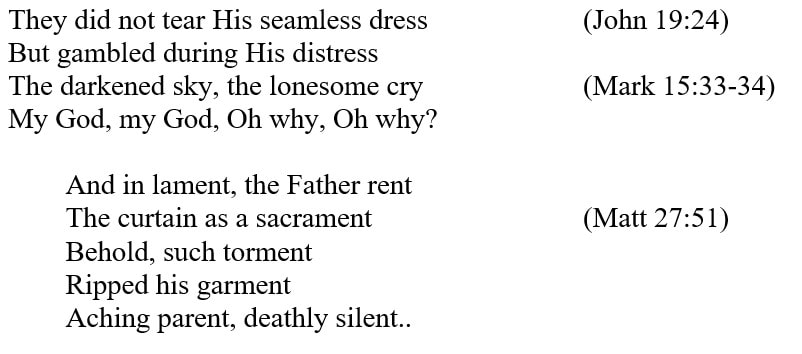
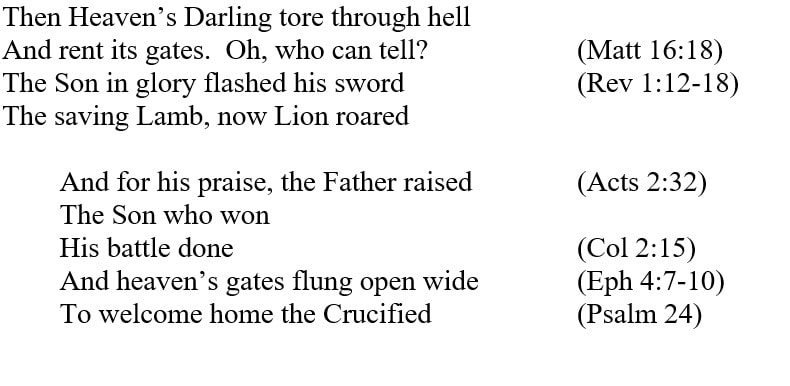


 RSS Feed
RSS Feed